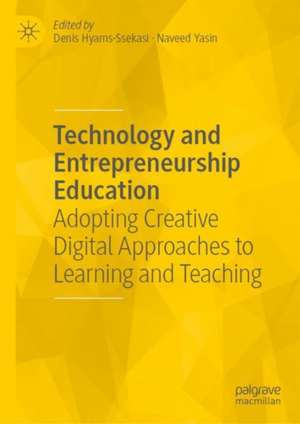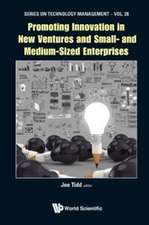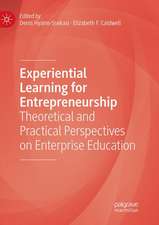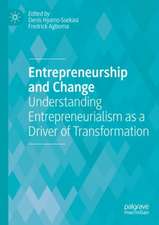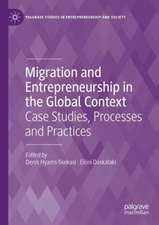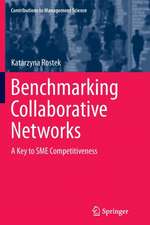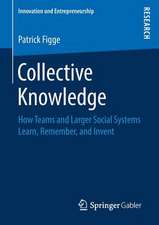Technology and Entrepreneurship Education: Adopting Creative Digital Approaches to Learning and Teaching
Editat de Denis Hyams-Ssekasi, Naveed Yasinen Limba Engleză Hardback – 18 mar 2022
The book directly addresses the need for effective practices in teaching and reinforces the rising interest and resilience in entrepreneurship. Comprising a number of distinct chapters that illuminate digitally assisted teaching methods that are used in practice to champion student engagement when learning enterprise and entrepreneurship. The contemporary practices allude to the notion that the adoption of simulations and game-based learning increases student’ comprehension, helps in retention of knowledge, and is an excellent way to introduce new content.
With the substantial challenges caused by the global pandemic this book is a vital resource at a time when blended learning is the new norm and mode of instruction in Higher Education. It is ideal for researchers, instructors and students with a keen interest in game-based approaches, as it encourages application and outlook towards entrepreneurship education.
| Toate formatele și edițiile | Preț | Express |
|---|---|---|
| Paperback (1) | 1088.22 lei 6-8 săpt. | |
| Springer International Publishing – 19 mar 2023 | 1088.22 lei 6-8 săpt. | |
| Hardback (1) | 939.28 lei 3-5 săpt. | +22.27 lei 4-10 zile |
| Springer International Publishing – 18 mar 2022 | 939.28 lei 3-5 săpt. | +22.27 lei 4-10 zile |
Preț: 939.28 lei
Preț vechi: 1174.10 lei
-20% Nou
Puncte Express: 1409
Preț estimativ în valută:
179.76€ • 187.27$ • 149.46£
179.76€ • 187.27$ • 149.46£
Carte disponibilă
Livrare economică 21 ianuarie-04 februarie 25
Livrare express 04-10 ianuarie 25 pentru 32.26 lei
Preluare comenzi: 021 569.72.76
Specificații
ISBN-13: 9783030842918
ISBN-10: 3030842916
Pagini: 264
Ilustrații: XXX, 264 p. 18 illus.
Dimensiuni: 148 x 210 x 24 mm
Greutate: 0.51 kg
Ediția:1st ed. 2022
Editura: Springer International Publishing
Colecția Palgrave Macmillan
Locul publicării:Cham, Switzerland
ISBN-10: 3030842916
Pagini: 264
Ilustrații: XXX, 264 p. 18 illus.
Dimensiuni: 148 x 210 x 24 mm
Greutate: 0.51 kg
Ediția:1st ed. 2022
Editura: Springer International Publishing
Colecția Palgrave Macmillan
Locul publicării:Cham, Switzerland
Cuprins
Chapter 1 - Editorial Introduction
1- Title: Teaching methodology courses in the context of entrepreneurship education
Dr Marlous Blankesteijn Assistant Professor Science , Business Innovation, Vrije Universiteit , Armstedam
Students commonly develop three things when engaged in an educational program: Knowledge, skills and a particular attitude. Many studies on entrepreneurship education focus on skills and attitudes, but to successfully finish an academic educational trajectory, one needs to prove to be capable of doing (rudimentary) scientific research, comprising a particular understanding of the scientific method. How to teach methodology within entrepreneurship education, in a way that it makes sense and appeals to these students? This chapter discusses and analyzes teaching methods developed for conveying a particular methodological approach, which is roughly based on the principles of case study research. The teaching methods expand the principles of case study research methodology in such a way that the methodological principles underlying case study research become relevant and useful for students in a science-based entrepreneurship educational program. The chapter formulates practical recommendations for academic methodology education in the context of entrepreneurship education, and opens up avenues for further research for furthering our theoretical knowledge on entrepreneurship education with regard to 1. entrepreneurial identity formation, 2. experiential project-based learning (Venture creation programs for example) and 3. the institutional identity of universities.
2- Measuring the Impact of Simulation-based Teaching on Entrepreneurial Skills of the MBA/DBA Students.
Aidin Salamzadeh, PhD Assistant Professor, University of Tehran
Simulation-based teaching is an emerging type of teaching in entrepreneurship education. This type of teaching, teachers generally use a variety of tools and techniques to let the students learn deeper than conventional methods. Besides, this type of teaching makes it possible for teachers to make sure that students have learned specific skills. Entrepreneurial skills are among the most complex skills to be taught as these type of skills are dedicated to entrepreneurs who comprise a small portion of any society. In fact, entrepreneurs are change agents in their societies. Then, their skills are entirely different from those of the other businesspersons, both in terms of quality and quantity. A significant number of potential entrepreneurs are not willing to register in typical academic degrees; instead, they prefer shorter courses and degrees. Hopefully, there are choices available for potential entrepreneurs in Iran which are specifically designed for them. Therefore, in this chapter, we will investigate the impact of simulation-based teaching on improving the entrepreneurial skills of 351 students who have earned their entrepreneurship MBA or DBA degrees from the Faculty of Entrepreneurship in the University of Tehran. We used a questionnaire to gather the data from 183 students, and the Smart PLS software is used to analyze the data. Findings revealed that simulation-based teaching increases the cognitive speed of the learners, and also helps them reorganize their prior knowledge more effectively. Moreover, this method considers individual differences of the learners and leads to deeper learning for them. In fact, this method motivates learners and improves their problem solving, critical thinking, mental and selfsufficiency skills.
Keywords: Simulation-based teaching, Entrepreneurial skills, MBA, DBA, Students
3- Teaching Digital Marketing for Entrepreneurship
Amiruddin Ahamat and Pang Jin Ai * Faculty of Technology Management & Technopreneurship, Universiti Teknikal Malaysia Melaka, Technology Campus, Malaysia
With changes happening in the future job market, universities and colleges are faced with the task to respond by adapting their teaching module or curriculum to cater to the different demands. These changes in the teaching module will allow students to gain skills, knowledge, and abilities that are relevant to current market needs. The new digital trend is moving towards focusing on digital skills in every industry such as digital advertising, digital marketing, e-commerce, and so on. This changes the future job market and leads to a rise in the need for new skills. As the new trend moves towards digitalization, graduates need to equip themselves with the latest skillsets to meet the future job market requirement. The aim of this study is to identify the factors that influence teaching delivery effectiveness in the digital marketing subject to study the impacts of studying digital marketing and to investigate the relationship between the effectiveness of teaching delivery and factors that influence teaching delivery effectiveness in digital marketing. The study adopts the quantitative methodology and is best suited for research that requires a large number of respondents during data collection, mostly used for theory testing. The results show that student characteristics do not affect the effectiveness of the teaching delivery of digital marketing in class. Furthermore, other factors such as teaching style, teaching model, and classroom climate influence the effectiveness of the teaching delivery of the digital marketing course. The contribution of this study enables university coordinators to engage closely with professional agencies by embedding a digital marketing certification program into the course syllabus to enhance students’ capabilities. Keywords: teaching, digital marketing, Malaysian university, delivery
4- A Case Based Framework for Online, Collaborative and International Entrepreneurship Education
Dr Anne Smith, Senior Lecturer, Entrepreneurship and Innovation, Glasgow School for Business and Society, Glasgow Caledonian University, Scotland
Entrepreneurship education across cultures, using online technologies is indeed a pedagogical challenge particularly since there is little evidence available to enhance our understanding of how to design an entrepreneurial learning environment that effectively combines cultural diversity with online communication technologies.
Delivering entrepreneurship education in a turbulent world remains essential in the drive to support global entrepreneurship and cross border trade, developing entrepreneurial talent is fundamental to support growing and developing economies. Student exchange, internships and mentoring schemes are often ways of educating future talent but in times of high costs, closed borders and low level mobility, how do we create an online international entrepreneurial learning environment that offers a global, inclusive and credible student experience? An online framework of entrepreneurial learning needs to be cost effective and enabling, any framework must engage with cultural diversity and be inclusive, the framework should offer experience of entrepreneurship and support learning, the framework should enable learning through activity. This chapter explains an online entrepreneurial learning framework utilising a partner based initiative called COIL, Collaborative Online International Learning, (www.COIL.SUNY.edu) that enables students to engage in collaborative projects involving students in other countries. The model is informed by a tested and trialled project, presented in this chapter as a case study detailing how entrepreneurship students embark in ‘live’ trade, by importing and exporting products to partner teams in USA that are then sold on campus. Students are required to research the overseas market opportunities, navigate logistics, customs and excise and then finally, sell the products at a profit. Underpinning the project activity is students’ ability to compare and contrast the process for importing/exporting goods in Scotland and the US, analyse what this comparison teaches us about conducting business with other nations, articulate factors for success in working with people from other cultures, adapt plans and finally, learn to collaborate and communicate with peers from diverse cultures using various technologies that support dynamic and time-bound project activities.
Our case study informs a cost effective, inclusive and applied framework which explains how to engage in online and collaborative entrepreneurship with international partners
· Structure main headings:
· International Entrepreneurship education as a global challenge
· Diversity and inclusion in entrepreneurial business
· Communication technologies for EE
· The case study
· Designing the online collaborative framework · Applied Collaborative and International Entrepreneurship Education
5- Understanding the possibilities and conditions for instructor-AI collaboration in entrepreneurship education
Dr Mamun Ala, Dr Tareq Rasul & Dr Sumesh Nair, Australian Institute of Business, Adelaide, Australia.
This chapter first briefly discusses the expected learning outcomes (i.e., skills and competencies) in entrepreneurship education, including creativity, innovation, industry-specific knowledge, decision-making, risk-taking, problem-solving, leadership qualities, ethics, and social responsibility. Next, the chapter examines whether the conventional entrepreneurial curriculum successfully contributes to the academic and social goals and meets the needs and expectations of students and society at large. It also presents a discussion on why the recent socio-cultural, technological, pandemic-related changes, including mass digitalization, working remotely or working from home, asynchronicity and global communities of practice, demand new approaches to enhance learners’ experience and maximize the achievement of learning outcomes in post-secondary entrepreneurship education. Then the chapter explores artificial intelligence (AI), such as the virtual classroom, AI Tutor, interactive smart boards, augmented reality (AR), virtual reality (VR), simulation, and big data systems, as a disruptive technology in education. While computer systems with ‘intelligence’ are already performing many tasks that were commonly associated with humans, there are growing interests, concerns and uncertainty regarding the wider application of AI in education. Accordingly, the chapter includes a discussion on the trends in AI adoption in education and how AI is likely to reshape curriculums, teaching and assessment, as well as its positive and negative impacts on teaching and learning. Further, this chapter explores the enormous potential of AI specifically in entrepreneurship education. A rich discussion is presented on the possibilities and conditions for an effective instructor-AI collaboration that can make an important contribution to all the key areas of teaching and learning in entrepreneurship education, such as the curriculum, instruction, assessment and feedback. An instructor-AI collaboration has the potential to improve curriculums, pedagogical practices, learner motivation and engagement, which are critical to achieving learning outcomes. The chapter concludes with the argument that while integrating AI in entrepreneurship education is capital intensive, it is worth investing in instructor-AI collaboration as it facilitates the progress of learners by providing them with customized learning support without unduly limiting individual choice.
6- Integration of MOOC in Entrepreneurship Education: Preliminary Evidence from Oman
Raihan Taqui Syed Faculty of Business & Economics, Modern College of Business & Science, Muscat, Oman and School of Management, University of Bradford, Yorkshire, UK and Rayyan Amour Al Noumani Faculty of Business & Economics, Modern College of Business & Science, Muscat, Oman
Purpose – Substantial efforts have been invested during the last decade to integrate MOOC into formal academic programs. Evidences and discussions have been published by researchers based in different parts of the world. However, entrepreneurship education is nascent in Oman and discussions on integration of MOOC into the formal curriculum in Higher Education Institutions (HEIs) have just begun. This paper analyses student experience of working on a MOOC module as part of assessment strategy of the Entrepreneurship Course pursued at junior level of their undergraduate program at Modern College of Business and Science, Muscat, Oman.
Design/methodology/approach – The research involves pilot study and incorporates case study method. The research focus fits within Social Constructivism / Interpretivism philosophy, utilises an inductive approach, embraces case study research strategy and employs focus groups as data collection technique.
Findings – Findings regarding integration of MOOC would provide insights / evidence regarding only enrichment the entrepreneurship course.
Research Limitations & Implications – Key limitation of the study is the smaller size of respondents group and studying in one HEI. However, this pilot study paves way for further conceptual and empirical research. Also, similar investigation could be carried out in other HEIs based in Oman and the region to generalize the findings and develop a theory.
Practical Implications – A comprehensive work encompassing more HEIs would result in formulating a framework for entrepreneurship educators. Also, publishing the findings would lead to efficient entrepreneurship development programs across Oman and the region.
Originality/value – This work exhibits the ingenuity of exploring the impact of integrating MOOC within academic entrepreneurship course in an HEI based in Oman.
Keywords – MOOC, Entrepreneurship Education, HEIs, Oman
7- Technology for Enterprise Education
Dr Mamun Ala, Dr Tareq Rasul & Dr Sumesh Nair, Australian Institute of Business, Adelaide, Australia.
Enterprise education help students to develop the required knowledge and skills to become an Entrepreneur. Enterprise education, along with social scientific issues, has proven to be helpful at increasing students’ confidence, self-reliance, and determination to success. Technology can be used as enabler for enterprise education.
Applied Technologies and Engineering is useful for enterprise education at increasing students' understanding of Design Thinking, Empathy, and Reasoning to real life situations.
In many colleges and universities, technology has been introduced as a subject or as an essential component of general education as a way of modern learning. However, we are seeking to enhance the student’s entrepreneurial skills using different types of applied technology platforms such as Virtual & Augmented Reality, Artificial Intelligence, Mobile Applications, Coding, and Robotics, where they can identify needs, wants, manage or develop a range of equipment, resources, processes, systems, services and environments. For example, Virtual reality offers a personalized experience to decision makers when developing a product or service as they can think like a user. Simulations via Augmented reality or physical prototyping using 3D printing can help entrepreneurs to prototype their solutions or products when pitching their ideas for investors to get funds. The main objective is to categorize all the available platforms especially for non-Technological/Engineering disciplines to make twenty-first century learning possible and help students develop the attitude, knowledge, and skills of an entrepreneur. One of the main examples is how Graphical coding helps non-engineers to create an application or game in minutes. Artificial intelligence can assist in customer services using chatbots and automate customer support via call directing systems.
Topics on cloud computing, Internet of Things and Project Management will also be discussed. Nowadays, many students are accessing cloud-based learning resources or store documents online for free. They can also access and manage work and information easily at any time and from anywhere.
Technologies on this research will also accelerate learning process to learn more at a less time. This research will help those students who are studying the traditional Management Information Systems (MIS) course to become an entrepreneur rather than an employee.
Correct utilization of technology for enterprise education will help start-ups and entrepreneurs to work efficiently and reduce cost.
8- Learning Fundamentals of Entrepreneurship through Gamification. Really?Dr Farrah Arif, National Incubation Center (NIC), Lahore - SBASSE, Lahore University of Management Science (LUMS),DHA, Lahore, Pakistan
Pakistan with 64% of youth (under 30 years old) population is an ideal environment for innovation based entrepreneurship. However, the traditional education system does not nurture entrepreneurial mindset amongst young people who go to schools and colleges.
Traditional vs Gamified Content Although there are a few institutes that have started teaching entrepreneurship just like another course in the undergraduate, the courses were taught in a regular class setting. Therefore, we don’t see much chance in the college driven entrepreneurship. We propose that simulation and gamification based activities starting from secondary schools till university education will bring a noticeable difference in entrepreneurialism.
Research Methodology A curriculum based on simulation and gamified content (group decision-making through solving case studies) is developed for two segments namely, secondary education (Grade 8, 9, 10) and College education ( undergraduate programs). The developed tools are being used in two different places with some of their students (approx. 200 plus). The pre and post entrepreneurlism will be measured. There will be a control group where entrepreneurship will be taught in a traditional way.
Results We hope to find major upward trend amongst those learners who have consumed simulation and gamified content as compared to those who were taught in a traditional environment. The article will also talk about the characteristics of simulation and the digitalized gamified content. For example, storyboards of simulation with which students can relate to. Similarly, the gamified content has local examples in it. Moreover, variables like analytical, critical and business skills were also being monitored along with the presimulation exposure. The Way Forward!
Once the efficacy of the simulations and the gamified content would be established, the same framework can be developed for other emerging economies by changing the context.
9- Gaming Simulations in Enterprise and Entrepreneurship EducationDr Naveed Yasin, Associate Professor in Enterpreneurship and Innovation, Canadian Universitym Dubai and Dr Denis Hyams-Ssekasi. Lecturer and Research Coordinator- University of Bolton- UK
The importance of enterprise simulation gaming is increasingly being recognised as an important feature of contemporary enterprise education teaching and learning pedagogy. Yasin and Hafeez (2018) in a qualitative study identified the effective practices for academics and practitioners in the instruction and assessment of simulation games (e.g. SimVenture and VentureBlocks) and its prominent use in the UK and U.S. However, until date, there is relatively little known about the broad range of simulation games that could be used in enterprise education. The proposed chapter intends to review the competitive marketplace for simulation games and to identify the aim, scope and target audience for such gamification approaches.
The study will be informed by secondary data – desk-based research by using web-searching tools (e.g. Google) and networking with simulation game providers to develop a comprehensive database that will serve as a starting to point for the proposed chapter. The data will be analysed through thematic analysis to identify the similarities and differences between each vendor’s provision for simulation and the acclaimed benefits and value that it offers to its end-user.
1- Title: Teaching methodology courses in the context of entrepreneurship education
Dr Marlous Blankesteijn Assistant Professor Science , Business Innovation, Vrije Universiteit , Armstedam
Students commonly develop three things when engaged in an educational program: Knowledge, skills and a particular attitude. Many studies on entrepreneurship education focus on skills and attitudes, but to successfully finish an academic educational trajectory, one needs to prove to be capable of doing (rudimentary) scientific research, comprising a particular understanding of the scientific method. How to teach methodology within entrepreneurship education, in a way that it makes sense and appeals to these students? This chapter discusses and analyzes teaching methods developed for conveying a particular methodological approach, which is roughly based on the principles of case study research. The teaching methods expand the principles of case study research methodology in such a way that the methodological principles underlying case study research become relevant and useful for students in a science-based entrepreneurship educational program. The chapter formulates practical recommendations for academic methodology education in the context of entrepreneurship education, and opens up avenues for further research for furthering our theoretical knowledge on entrepreneurship education with regard to 1. entrepreneurial identity formation, 2. experiential project-based learning (Venture creation programs for example) and 3. the institutional identity of universities.
2- Measuring the Impact of Simulation-based Teaching on Entrepreneurial Skills of the MBA/DBA Students.
Aidin Salamzadeh, PhD Assistant Professor, University of Tehran
Simulation-based teaching is an emerging type of teaching in entrepreneurship education. This type of teaching, teachers generally use a variety of tools and techniques to let the students learn deeper than conventional methods. Besides, this type of teaching makes it possible for teachers to make sure that students have learned specific skills. Entrepreneurial skills are among the most complex skills to be taught as these type of skills are dedicated to entrepreneurs who comprise a small portion of any society. In fact, entrepreneurs are change agents in their societies. Then, their skills are entirely different from those of the other businesspersons, both in terms of quality and quantity. A significant number of potential entrepreneurs are not willing to register in typical academic degrees; instead, they prefer shorter courses and degrees. Hopefully, there are choices available for potential entrepreneurs in Iran which are specifically designed for them. Therefore, in this chapter, we will investigate the impact of simulation-based teaching on improving the entrepreneurial skills of 351 students who have earned their entrepreneurship MBA or DBA degrees from the Faculty of Entrepreneurship in the University of Tehran. We used a questionnaire to gather the data from 183 students, and the Smart PLS software is used to analyze the data. Findings revealed that simulation-based teaching increases the cognitive speed of the learners, and also helps them reorganize their prior knowledge more effectively. Moreover, this method considers individual differences of the learners and leads to deeper learning for them. In fact, this method motivates learners and improves their problem solving, critical thinking, mental and selfsufficiency skills.
Keywords: Simulation-based teaching, Entrepreneurial skills, MBA, DBA, Students
3- Teaching Digital Marketing for Entrepreneurship
Amiruddin Ahamat and Pang Jin Ai * Faculty of Technology Management & Technopreneurship, Universiti Teknikal Malaysia Melaka, Technology Campus, Malaysia
With changes happening in the future job market, universities and colleges are faced with the task to respond by adapting their teaching module or curriculum to cater to the different demands. These changes in the teaching module will allow students to gain skills, knowledge, and abilities that are relevant to current market needs. The new digital trend is moving towards focusing on digital skills in every industry such as digital advertising, digital marketing, e-commerce, and so on. This changes the future job market and leads to a rise in the need for new skills. As the new trend moves towards digitalization, graduates need to equip themselves with the latest skillsets to meet the future job market requirement. The aim of this study is to identify the factors that influence teaching delivery effectiveness in the digital marketing subject to study the impacts of studying digital marketing and to investigate the relationship between the effectiveness of teaching delivery and factors that influence teaching delivery effectiveness in digital marketing. The study adopts the quantitative methodology and is best suited for research that requires a large number of respondents during data collection, mostly used for theory testing. The results show that student characteristics do not affect the effectiveness of the teaching delivery of digital marketing in class. Furthermore, other factors such as teaching style, teaching model, and classroom climate influence the effectiveness of the teaching delivery of the digital marketing course. The contribution of this study enables university coordinators to engage closely with professional agencies by embedding a digital marketing certification program into the course syllabus to enhance students’ capabilities. Keywords: teaching, digital marketing, Malaysian university, delivery
4- A Case Based Framework for Online, Collaborative and International Entrepreneurship Education
Dr Anne Smith, Senior Lecturer, Entrepreneurship and Innovation, Glasgow School for Business and Society, Glasgow Caledonian University, Scotland
Entrepreneurship education across cultures, using online technologies is indeed a pedagogical challenge particularly since there is little evidence available to enhance our understanding of how to design an entrepreneurial learning environment that effectively combines cultural diversity with online communication technologies.
Delivering entrepreneurship education in a turbulent world remains essential in the drive to support global entrepreneurship and cross border trade, developing entrepreneurial talent is fundamental to support growing and developing economies. Student exchange, internships and mentoring schemes are often ways of educating future talent but in times of high costs, closed borders and low level mobility, how do we create an online international entrepreneurial learning environment that offers a global, inclusive and credible student experience? An online framework of entrepreneurial learning needs to be cost effective and enabling, any framework must engage with cultural diversity and be inclusive, the framework should offer experience of entrepreneurship and support learning, the framework should enable learning through activity. This chapter explains an online entrepreneurial learning framework utilising a partner based initiative called COIL, Collaborative Online International Learning, (www.COIL.SUNY.edu) that enables students to engage in collaborative projects involving students in other countries. The model is informed by a tested and trialled project, presented in this chapter as a case study detailing how entrepreneurship students embark in ‘live’ trade, by importing and exporting products to partner teams in USA that are then sold on campus. Students are required to research the overseas market opportunities, navigate logistics, customs and excise and then finally, sell the products at a profit. Underpinning the project activity is students’ ability to compare and contrast the process for importing/exporting goods in Scotland and the US, analyse what this comparison teaches us about conducting business with other nations, articulate factors for success in working with people from other cultures, adapt plans and finally, learn to collaborate and communicate with peers from diverse cultures using various technologies that support dynamic and time-bound project activities.
Our case study informs a cost effective, inclusive and applied framework which explains how to engage in online and collaborative entrepreneurship with international partners
· Structure main headings:
· International Entrepreneurship education as a global challenge
· Diversity and inclusion in entrepreneurial business
· Communication technologies for EE
· The case study
· Designing the online collaborative framework · Applied Collaborative and International Entrepreneurship Education
5- Understanding the possibilities and conditions for instructor-AI collaboration in entrepreneurship education
Dr Mamun Ala, Dr Tareq Rasul & Dr Sumesh Nair, Australian Institute of Business, Adelaide, Australia.
This chapter first briefly discusses the expected learning outcomes (i.e., skills and competencies) in entrepreneurship education, including creativity, innovation, industry-specific knowledge, decision-making, risk-taking, problem-solving, leadership qualities, ethics, and social responsibility. Next, the chapter examines whether the conventional entrepreneurial curriculum successfully contributes to the academic and social goals and meets the needs and expectations of students and society at large. It also presents a discussion on why the recent socio-cultural, technological, pandemic-related changes, including mass digitalization, working remotely or working from home, asynchronicity and global communities of practice, demand new approaches to enhance learners’ experience and maximize the achievement of learning outcomes in post-secondary entrepreneurship education. Then the chapter explores artificial intelligence (AI), such as the virtual classroom, AI Tutor, interactive smart boards, augmented reality (AR), virtual reality (VR), simulation, and big data systems, as a disruptive technology in education. While computer systems with ‘intelligence’ are already performing many tasks that were commonly associated with humans, there are growing interests, concerns and uncertainty regarding the wider application of AI in education. Accordingly, the chapter includes a discussion on the trends in AI adoption in education and how AI is likely to reshape curriculums, teaching and assessment, as well as its positive and negative impacts on teaching and learning. Further, this chapter explores the enormous potential of AI specifically in entrepreneurship education. A rich discussion is presented on the possibilities and conditions for an effective instructor-AI collaboration that can make an important contribution to all the key areas of teaching and learning in entrepreneurship education, such as the curriculum, instruction, assessment and feedback. An instructor-AI collaboration has the potential to improve curriculums, pedagogical practices, learner motivation and engagement, which are critical to achieving learning outcomes. The chapter concludes with the argument that while integrating AI in entrepreneurship education is capital intensive, it is worth investing in instructor-AI collaboration as it facilitates the progress of learners by providing them with customized learning support without unduly limiting individual choice.
6- Integration of MOOC in Entrepreneurship Education: Preliminary Evidence from Oman
Raihan Taqui Syed Faculty of Business & Economics, Modern College of Business & Science, Muscat, Oman and School of Management, University of Bradford, Yorkshire, UK and Rayyan Amour Al Noumani Faculty of Business & Economics, Modern College of Business & Science, Muscat, Oman
Purpose – Substantial efforts have been invested during the last decade to integrate MOOC into formal academic programs. Evidences and discussions have been published by researchers based in different parts of the world. However, entrepreneurship education is nascent in Oman and discussions on integration of MOOC into the formal curriculum in Higher Education Institutions (HEIs) have just begun. This paper analyses student experience of working on a MOOC module as part of assessment strategy of the Entrepreneurship Course pursued at junior level of their undergraduate program at Modern College of Business and Science, Muscat, Oman.
Design/methodology/approach – The research involves pilot study and incorporates case study method. The research focus fits within Social Constructivism / Interpretivism philosophy, utilises an inductive approach, embraces case study research strategy and employs focus groups as data collection technique.
Findings – Findings regarding integration of MOOC would provide insights / evidence regarding only enrichment the entrepreneurship course.
Research Limitations & Implications – Key limitation of the study is the smaller size of respondents group and studying in one HEI. However, this pilot study paves way for further conceptual and empirical research. Also, similar investigation could be carried out in other HEIs based in Oman and the region to generalize the findings and develop a theory.
Practical Implications – A comprehensive work encompassing more HEIs would result in formulating a framework for entrepreneurship educators. Also, publishing the findings would lead to efficient entrepreneurship development programs across Oman and the region.
Originality/value – This work exhibits the ingenuity of exploring the impact of integrating MOOC within academic entrepreneurship course in an HEI based in Oman.
Keywords – MOOC, Entrepreneurship Education, HEIs, Oman
7- Technology for Enterprise Education
Dr Mamun Ala, Dr Tareq Rasul & Dr Sumesh Nair, Australian Institute of Business, Adelaide, Australia.
Enterprise education help students to develop the required knowledge and skills to become an Entrepreneur. Enterprise education, along with social scientific issues, has proven to be helpful at increasing students’ confidence, self-reliance, and determination to success. Technology can be used as enabler for enterprise education.
Applied Technologies and Engineering is useful for enterprise education at increasing students' understanding of Design Thinking, Empathy, and Reasoning to real life situations.
In many colleges and universities, technology has been introduced as a subject or as an essential component of general education as a way of modern learning. However, we are seeking to enhance the student’s entrepreneurial skills using different types of applied technology platforms such as Virtual & Augmented Reality, Artificial Intelligence, Mobile Applications, Coding, and Robotics, where they can identify needs, wants, manage or develop a range of equipment, resources, processes, systems, services and environments. For example, Virtual reality offers a personalized experience to decision makers when developing a product or service as they can think like a user. Simulations via Augmented reality or physical prototyping using 3D printing can help entrepreneurs to prototype their solutions or products when pitching their ideas for investors to get funds. The main objective is to categorize all the available platforms especially for non-Technological/Engineering disciplines to make twenty-first century learning possible and help students develop the attitude, knowledge, and skills of an entrepreneur. One of the main examples is how Graphical coding helps non-engineers to create an application or game in minutes. Artificial intelligence can assist in customer services using chatbots and automate customer support via call directing systems.
Topics on cloud computing, Internet of Things and Project Management will also be discussed. Nowadays, many students are accessing cloud-based learning resources or store documents online for free. They can also access and manage work and information easily at any time and from anywhere.
Technologies on this research will also accelerate learning process to learn more at a less time. This research will help those students who are studying the traditional Management Information Systems (MIS) course to become an entrepreneur rather than an employee.
Correct utilization of technology for enterprise education will help start-ups and entrepreneurs to work efficiently and reduce cost.
8- Learning Fundamentals of Entrepreneurship through Gamification. Really?Dr Farrah Arif, National Incubation Center (NIC), Lahore - SBASSE, Lahore University of Management Science (LUMS),DHA, Lahore, Pakistan
Pakistan with 64% of youth (under 30 years old) population is an ideal environment for innovation based entrepreneurship. However, the traditional education system does not nurture entrepreneurial mindset amongst young people who go to schools and colleges.
Traditional vs Gamified Content Although there are a few institutes that have started teaching entrepreneurship just like another course in the undergraduate, the courses were taught in a regular class setting. Therefore, we don’t see much chance in the college driven entrepreneurship. We propose that simulation and gamification based activities starting from secondary schools till university education will bring a noticeable difference in entrepreneurialism.
Research Methodology A curriculum based on simulation and gamified content (group decision-making through solving case studies) is developed for two segments namely, secondary education (Grade 8, 9, 10) and College education ( undergraduate programs). The developed tools are being used in two different places with some of their students (approx. 200 plus). The pre and post entrepreneurlism will be measured. There will be a control group where entrepreneurship will be taught in a traditional way.
Results We hope to find major upward trend amongst those learners who have consumed simulation and gamified content as compared to those who were taught in a traditional environment. The article will also talk about the characteristics of simulation and the digitalized gamified content. For example, storyboards of simulation with which students can relate to. Similarly, the gamified content has local examples in it. Moreover, variables like analytical, critical and business skills were also being monitored along with the presimulation exposure. The Way Forward!
Once the efficacy of the simulations and the gamified content would be established, the same framework can be developed for other emerging economies by changing the context.
9- Gaming Simulations in Enterprise and Entrepreneurship EducationDr Naveed Yasin, Associate Professor in Enterpreneurship and Innovation, Canadian Universitym Dubai and Dr Denis Hyams-Ssekasi. Lecturer and Research Coordinator- University of Bolton- UK
The importance of enterprise simulation gaming is increasingly being recognised as an important feature of contemporary enterprise education teaching and learning pedagogy. Yasin and Hafeez (2018) in a qualitative study identified the effective practices for academics and practitioners in the instruction and assessment of simulation games (e.g. SimVenture and VentureBlocks) and its prominent use in the UK and U.S. However, until date, there is relatively little known about the broad range of simulation games that could be used in enterprise education. The proposed chapter intends to review the competitive marketplace for simulation games and to identify the aim, scope and target audience for such gamification approaches.
The study will be informed by secondary data – desk-based research by using web-searching tools (e.g. Google) and networking with simulation game providers to develop a comprehensive database that will serve as a starting to point for the proposed chapter. The data will be analysed through thematic analysis to identify the similarities and differences between each vendor’s provision for simulation and the acclaimed benefits and value that it offers to its end-user.
Notă biografică
Denis Hyams-Ssekasi is a Research Coordinator and lecturer in Business Management at the University of Bolton, UK. He has developed and delivered modules on Entrepreneurship, ran several mentoring schemes and offered consultancy to start-up business. He is the author of ‘Experiential learning for Entrepreneurship: Theoretical and Practical Perspectives on Entrepreneurship Education’.
Naveed Yasin is a Full Professor of Entrepreneurship at the Canadian University Dubai, United Arab Emirates. He is the award winner of the highly acclaimed ‘Outstanding All-Round Academic Award’ conferred by the Teaching and Learning Institute (UK) and Senior Fellow of the Higher Education Academy, Chartered Manager and Companion of CMi (UK), and CIM Chartered Manager (Canada).
Naveed Yasin is a Full Professor of Entrepreneurship at the Canadian University Dubai, United Arab Emirates. He is the award winner of the highly acclaimed ‘Outstanding All-Round Academic Award’ conferred by the Teaching and Learning Institute (UK) and Senior Fellow of the Higher Education Academy, Chartered Manager and Companion of CMi (UK), and CIM Chartered Manager (Canada).
Textul de pe ultima copertă
This contemporary book offers valuable insights on digital technology and entrepreneurship education, highlighting the importance of adopting creative digital approaches to learning and teaching. It raises the questions as to whether the current approaches utilised to convey entrepreneurial knowledge are adequate enough when preparing graduates for prospective careers.
The book directly addresses the need for effective practices in teaching and reinforces the rising interest and resilience in entrepreneurship. Comprising a number of distinct chapters that illuminate digitally assisted teaching methods that are used in practice to champion student engagement when learning enterprise and entrepreneurship. The contemporary practices allude to the notion that the adoption of simulations and game-based learning increases student’ comprehension, helps in retention of knowledge, and is an excellent way to introduce new content. With the substantial challenges caused by the global pandemic this book is a vital resource at a time when blended learning is the new norm and mode of instruction in Higher Education. It is ideal for researchers, instructors and students with a keen interest in game-based approaches, as it encourages application and outlook towards entrepreneurship education.
Denis Hyams-Ssekasi is a Research Coordinator and lecturer in Business Management at the University of Bolton, UK. He has developed and delivered modules on Entrepreneurship, ran several mentoring schemes and offered consultancy to start-up business. He is the author of ‘Experiential learning for Entrepreneurship: Theoretical and Practical Perspectives on Entrepreneurship Education’.
Naveed Yasin is a Full Professor of Entrepreneurship at the Canadian University Dubai, United Arab Emirates. He is the award winner of the highly acclaimed ‘Outstanding All-Round Academic Award’ conferred by the Teaching and Learning Institute (UK) and Senior Fellow of the Higher Education Academy, Chartered Manager and Companion of CMi (UK), and CIM Chartered Manager (Canada).
The book directly addresses the need for effective practices in teaching and reinforces the rising interest and resilience in entrepreneurship. Comprising a number of distinct chapters that illuminate digitally assisted teaching methods that are used in practice to champion student engagement when learning enterprise and entrepreneurship. The contemporary practices allude to the notion that the adoption of simulations and game-based learning increases student’ comprehension, helps in retention of knowledge, and is an excellent way to introduce new content. With the substantial challenges caused by the global pandemic this book is a vital resource at a time when blended learning is the new norm and mode of instruction in Higher Education. It is ideal for researchers, instructors and students with a keen interest in game-based approaches, as it encourages application and outlook towards entrepreneurship education.
Denis Hyams-Ssekasi is a Research Coordinator and lecturer in Business Management at the University of Bolton, UK. He has developed and delivered modules on Entrepreneurship, ran several mentoring schemes and offered consultancy to start-up business. He is the author of ‘Experiential learning for Entrepreneurship: Theoretical and Practical Perspectives on Entrepreneurship Education’.
Naveed Yasin is a Full Professor of Entrepreneurship at the Canadian University Dubai, United Arab Emirates. He is the award winner of the highly acclaimed ‘Outstanding All-Round Academic Award’ conferred by the Teaching and Learning Institute (UK) and Senior Fellow of the Higher Education Academy, Chartered Manager and Companion of CMi (UK), and CIM Chartered Manager (Canada).
Caracteristici
Bridges the gap between academia and practice by offering research on successful implementation practices
Considers the impact of Covid-19 and digital models of teaching and learning
Includes contributions from Australia, the U.A.E, Europe, the Middle East and Asia
Considers the impact of Covid-19 and digital models of teaching and learning
Includes contributions from Australia, the U.A.E, Europe, the Middle East and Asia
